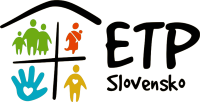How to Work with Roma Parents
How can parents in marginalized Roma communities create a high stimuli environment for their children? How to motivate them to do so? How to stimulate parents to raise their children in an appropriate manner, if they do not even know what is needed?
These were just a few out of many questions that were tackled during a two-day workshop for the staff members of ETP Slovakia that was led by Iva Grejtáková and Andrej Gliganič, experienced lecturers from the People in Need organization. The first day of the training was held in the community center in Sveržov where the lecturers work. The second day took place in the community center in Košice-Šaca that is run by ETP Slovakia.
“It is necessary to grab the parents’ attention,” the lecturers summed up shortly. “The biggest mistake is to have unrealistic expectations.”
As everything is interconnected, there is no universal practise of how to work with parents. According to the lecturers, “Most importantly, it is essential to know the needs and interests of the clients, and then to use this information in developing a tailored programme. No one is interested in children education, if there is nothing to eat.” Thus, it is necessary to come up with programmes that not only catch the parents’s attention in a given locality but also help to achieve the core objective that is to motivate Roma parents spend time with their children in a more constructive and meaningful manner.
Since the workshop delivered by Iva and Andrej was designed in an interactive way, ETP staff members were actively involved in the learning-by-doing process. They were asked to write all sorts of factors and agents that influence the education process of a child in both, positive and negative ways, on colourful memo notes. Subsequently, they needed to classify their ideas into categories of importance and present it to the rest of the group.
According to Jarka Vorobeľová, the community center leader from Košice –Šaca who hosted the training, and her assistant Martina, the main agent of the whole education process is a child who is being strongly influenced, both positively and negatively, by parents, grandparents, siblings and peers. To lesser extent a child is also being influenced by neighbours and school, and encouraged by the community center and social field workers. Further spheres of influence also include media, health workers and education institutions, for instance local kindergarten.
The leader of the community center in Moldava nad Bodvou, Irma Horváthová, pointed out the importance of religion and a substantial role of the community center while the influence of the social field workers does not seem to play a major role in her community. Ivan Hricko, the community center leader in Sabinov, mentioned the significance of the personality of a community worker.
ETP staff members from Rankovce reminded that children themselves have a big impact on family functioning.
The last group to present was a team from Stará Ľubovňa. They humorously designed the spheres of influence in their location starting from the very top represented by the sky, followed by the sun, continuing via children to family, city, police, social curatorship and a local leisure center.
At the end, it was not difficult to answer Iva’s question, “What have you learned throughout this exercise?” Everyone realized that there are too many factors influencing children and parents and that it is necessary to work with all of them (maybe except the sun and the sky). Puzzle consisting of colourful memo notes was a very good exercise that helped all participants to name individual elements and agents of influence and to create a bigger existential picture which is definitely an excellent technique for finding solutions to extensive problems.
Each puzzle proved that the influence of a parent on a child is enormous. Nevertheless, a very little attention has been paid to parents so far. The aim of the project is to change this. ETP staff members are determined to motivate Roma parents to spend more time with their children by teaching them to think of different meaningful activities, such as conversing, playing, helping with homework, and reading. It is possible to do it individually; however, ETP team opted for a group work instead. In Veľká Ida and Košice – Šaca, they invited parents of children of preschool age to come to the community center and asked them to participate in all activities including cutting basic paper shapes, studying, as well as playing.
For instance, the parent-child activity gathering in Veľká Ida resulted in creation of beautiful beaming paper suns.
In the upcoming year, from January till June, the workshop participants will attend six supervision sessions during which the encountered problems and challenges will be discussed. In cooperation with the lecturers ETP staff members will be using interactive brainstorming to define problems and design solutions.
The project Mothers’ Clubs in Marginalized Roma Communities was funded by ENGAGEMENT GLOBAL gGmbH from Düsseldorf, Germany.

